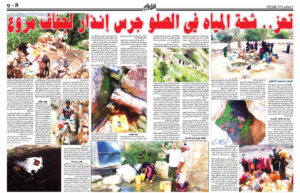This article is quoted from the International Journalists Network website - link to the original article published on April 18, 2023 here
Prior to the twenty-seventh Conference of the Parties (COP27), which was held in the Egyptian city of Sharm El-Sheikh, in November 2022, I received an invitation from the “Doctors without borders“To conduct a training session for a group of journalists residing in Egypt on writing journalistic stories on health-related climate change issues, and I began preparing for the session based on the question, “How does climate change affect our health?”
And he agreed Global Health OrganizationThere are many health consequences associated with climate change, as it affects the basic determinants of health, which are clean air, adequate shelter, clean water, food, and safety from disease. Hence, the general health of humans and animals is affected.
For example, damaged agriculture and food shortages lead to diseases such as malnutrition. Storms, floods, fires that destroy homes and cities, and air pollution also result in many injuries, diseases, and deaths.
High temperatures also lead to the spread of diseases such as cholera and diarrhea, and heat stress may lead to deaths, especially among infants and the elderly. Climate change is also linked to a change in the geographical distribution of insects that transmit infectious diseases such as malaria and dengue fever.
The World Health Organization reports that climate change undermines many social determinants of good health, such as livelihoods, equality, access to health care and social support structures.
The impact is compounded on the most vulnerable and disadvantaged groups, including women, children, ethnic minorities, poor, migrant and displaced communities and older people.
These serious repercussions led the organization to describe climate change as “the greatest health threat facing humanity.”
The negative impact is not limited to human health, but all assets are affected, and according to a study titled Protecting Animal Health to Help Reduce the Effects of Climate Change on Hunger and Poverty prepared by the Food and Agriculture Organization of the United Nations (FAO), environmental conditions such as drought, fires, and floods caused by climate and heat stress affect Unpredictable weather affects the physiological and immune responses of livestock. In return, improving animal health would contribute to reducing climate change because healthier animals are more productive and cause fewer emissions.
Roles and issues that can be addressed in press reports:
Based on these facts, we find before us many press reports waiting to be written about to alert people to current and future risks and methods of prevention and treatment, share stories of affected people and the most vulnerable groups, and propose and discuss solutions with experts, researchers, officials and local communities in a way that helps mitigate these effects and help communities. We must adapt, become climate resilient, and push for change in activities and policies that exacerbate such health and life-threatening consequences. Between 2030 and 2050, climate change is expected to cause approximately 250,000 additional deaths each year from malnutrition, malaria, diarrhea and heat stress. In addition to economic losses, ranging between 2 and 4 billion US dollars annually by 2030, according to the World Health Organization.
We can write about the causes that lead to worsening health damage, such as the expansion of the use of fossil fuels, the impact of environmentally polluting industries on the health of citizens and animals, government policies and the extent of their response to international recommendations, and the necessary measures to reduce the health bill and reduce greenhouse gas emissions by talking about the need to improve transportation services and overall The resulting emissions, food choices, energy use, and other ways that can reduce emissions and thus improve health.
The Intergovernmental Panel on Climate Change has concluded that to avoid catastrophic health impacts and millions of deaths linked to climate change, the world will need to limit temperature increases to less than 1.5 degrees Celsius.
Reports and investigations can also monitor and document the health damage occurring in a specific area and link it to surrounding pollutants and human activities, or review studies that revealed the diverse effects and methods of adaptation and adaptation of animals most affected by climate change and threatened with extinction, such as the study conducted by researchers from the University of Southern Denmark in 2022 and developed Lists of animals least and most threatened by climate change.
Coverage of health and climate change issues can also be from the perspective of solutions journalism, and it reviews proposed and proposed solutions to improve health and reduce health damage to a specific group of people, residents of a specific area, or a specific species of animal through reviewing, explaining, interpreting, and discussing studies, research, initiatives, and projects based on The local and international level and the extent of success achieved in reducing health damage.
Or the coverage monitors the health impacts associated with a specific sector, such as the food system, and how emissions from this sector can be reduced and how this can improve health. For example, an angle could be chosen to address the topic of “climate-smart health care”, which is health care systems that take into account environmental standards and try to Reducing the emissions resulting from it in an attempt to build climate resilience and flexibility), while providing explanation and clarification of the procedures that can reduce carbon emissions in medical institutions, and communicating with the management of a green hospital to talk about its experience. You can refer to these sites to learn more about climate-smart health care: Care Healthy without harm, a green and healthy global hospital network.
In covering the issue of health and climate change, we must not neglect to monitor the mental health effects resulting from climate change. You can refer to this previous article (Health impact of climate change...and these are the most prominent ways to cover it) to learn more about environmental anxiety and sadness and methods of press coverage.
– Sources for obtaining data and information:
The World Health Organization website includes many reports that provide information and statistics. For example, we can learn from this report issued in 2021, which includes a number of recommendations made by the organization in this regard, that fossil fuels cause the death of 13 people per minute around the world, and that Reducing air pollution levels could reduce total deaths caused by air pollution globally by 80%.
We also know that shifting to nutritious plant-based diets would significantly reduce global emissions, increase the resilience of food systems, and prevent up to 5.1 million diet-related deaths annually by 2050.
-The World Meteorological Organization’s report on climate hazards that have health impacts, from which we learn, for example, information, explanation, and interpretation of some weather phenomena and their repercussions on health, such as drought, floods, storms, and extreme temperatures. Among this information is that there are about 60,000 people who die annually as a result of extreme weather phenomena. .
-The Health at the Mercy of Fossil Fuels report, issued by The Lancet in 2022, provides a lot of information about heat-related deaths and monitors the spread of infectious diseases such as malaria and dengue fever in some regions, and how extreme climate phenomena have increased pressure on health services.
A report by the Food and Agriculture Organization of the United Nations (FAO) issued in 2022 entitled “The Role of Animal Health in National Climate Commitments” reveals that attention to animal health has become a necessity for reducing greenhouse gas emissions, and calls on countries to develop a system to include improving animal health among their national commitments. Climate-related.
You can also learn more statistics about the volume of emissions from livestock through another FAO report entitled Addressing Climate Change through Livestock. Among the numbers included in the report is that methane gas alone constitutes 44% of livestock emissions.
You can refer to Google's Environmental Insights Explorer website in order to obtain data about the total and details of emissions from sectors such as transportation and buildings within each country and city, write about the most polluting and harmful means of transportation to health, or make comparisons between cities and countries in producing emissions from the building sector. .
-International organizations and bodies concerned with health and climate change:
Global Health Organization
Healthy Environment and Climate Action Foundation
Climate and Health Alliance
Global Alliance for Climate and Health
A global network of green and healthy hospitals
Harvard Center for Climate, Health, and Environment
Tips when covering:
-Humanize stories by communicating with health-affected people and conveying their suffering honestly and sensitively.
-Choose a specific angle for coverage so that the report does not turn into a research paper.
-Diversity in sources among researchers, doctors, initiative owners, officials and local communities to highlight various aspects related to the story.
- Highlighting and documenting health damages with possible evidence such as medical reports, hospital records, practical tests and other available documents.
-Publish videos and photos documenting polluting activities and sources of emissions.
-Relying on recent studies to ensure obtaining updated data and figures.
-Comparing the local situation with what is happening internationally to present a correct picture without exaggeration or understatement.
-Simplifying the scientific and medical content, and providing explanation and clarification to the reader of the various health effects and methods of prevention and treatment whenever possible.
- Coverage should not be limited to reviewing the increasing rates of infection and the exacerbation of diseases without providing solutions and initiatives to contain the damage so that press reports do not lead to adverse results that push the reader away from the content presented.
- Press models:
“Aswan Scorpions” draws attention to the health risks associated with climate change
Black Inhale - Investigative Report
Main photo from a training session organized by MSF in October 2022 in Cairo - photographed by Bassam Al-Qadi





